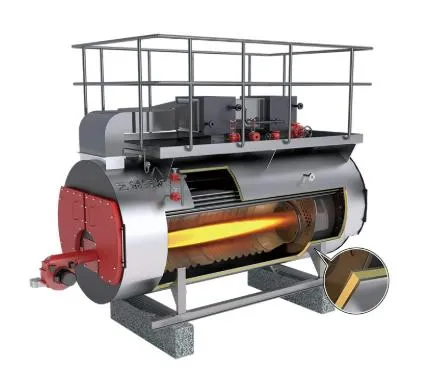High Efficiency Water Boiler: The Inevitable Choice For Sustainable Development
In an era where energy is increasingly scarce and environmental awareness is growing, high efficiency and energy conservation have become the goals pursued by various industries. As an important source of heat energy in industrial production and residential life, the energy-saving transformation of water boilers is particularly important. High Efficiency Water Boiler, with its significant energy-saving benefits and environmentally friendly characteristics, is gradually becoming a substitute for traditional boilers and an inevitable choice for achieving sustainable development.

Traditional water boilers often have low efficiency and serious energy waste, which is different from High Efficiency Water Boilers
The main reasons include incomplete combustion, excessive heat loss from flue gas, and scale affecting heat transfer efficiency. The low pressure hot water boiler has undergone comprehensive optimization design to address these issues, significantly improving thermal efficiency through the use of advanced combustion technology, waste heat recovery technology, and intelligent control systems.
Efficient combustion technology is the key to improving boiler efficiency
Advanced burner design enables full combustion of fuel, reducing unburned carbon emissions and the generation of harmful gases. By precisely controlling the ratio of air to fuel and optimizing the structure of the combustion chamber, combustion efficiency can be maximized and energy consumption can be reduced.
The application of waste heat recovery technology is an important means to improve the efficiency of High Efficiency Water Boiler
Boiler flue gas contains a large amount of thermal energy, and if directly discharged, it will cause huge energy waste. Industrial electric water boilers are usually equipped with waste heat recovery devices such as flue gas condensers or economizers, which can recover and utilize the waste heat in the flue gas, preheat the inlet water or air, thereby reducing the exhaust temperature of the boiler and improving overall thermal efficiency.
The application of intelligent control system also provides guarantee for the operation of High Efficiency Water Boiler
The intelligent control system can monitor the operating parameters of the boiler in real time and automatically adjust the fuel supply, air volume, etc. according to actual needs, so that the boiler is always in the optimal operating state. At the same time, the intelligent control system also has fault diagnosis and alarm functions, which can timely detect and eliminate potential safety hazards, ensuring the safe and stable operation of the boiler.
Promoting and applying thermal water boilers can not only reduce energy consumption and operating costs, but also significantly reduce pollutant emissions and improve environmental quality. By improving energy efficiency and reducing the combustion of fossil fuels, greenhouse gas emissions can be effectively controlled, mitigating the negative impacts of climate change. At the same time, the promotion and application of High Efficiency Water Boiler will also promote technological innovation and development in related industries, drive the transformation and upgrading of energy structure, and contribute to achieving sustainable development.
In summary, industrial hot water boilers are the best choice to replace traditional boilers due to their excellent energy-saving benefits and environmentally friendly characteristics. With the continuous advancement of technology and the increasing popularity of applications, High Efficiency Water Boiler will play an increasingly important role in the energy field and become a key support for achieving sustainable development.
High Efficiency Water Boiler FAQs
What is High Efficiency Water Boiler? What are its core advantages?
High Efficiency Water Boiler is a hot water boiler that achieves a thermal efficiency of over 90% (traditional boilers typically have 80% -85%) by optimizing combustion, heat exchange, and control systems.
Core advantages:
Energy conservation and consumption reduction: Reduce fuel costs (such as natural gas, electricity, or biomass).
Low emissions: Adopting condensation technology to reduce NOx and CO ₂ emissions.
Quick response: Intelligent control, on-demand heating, reducing standby losses.
How does a High Efficiency Water Boiler achieve high energy efficiency?
Key technologies include:
Condensation technology: Recovering the latent heat of water vapor in flue gas (reducing the exhaust temperature to below the dew point).
Fully premixed combustion: precise mixing of air and fuel for more complete combustion.
Variable frequency control: Adjust the speed of the water pump/fan according to the load to avoid energy waste.
Efficient heat exchanger: using corrosion-resistant materials (such as stainless steel/aluminum silicon alloy) to increase the heat transfer area.
What application scenarios is High Efficiency Water Boiler suitable for?
District heating: centralized heating for residential buildings, schools, hospitals, etc.
Industrial heat: process hot water, cleaning, preheating, etc.
Commercial facilities: hotel, swimming pool, greenhouse with constant temperature.
Combined with renewable energy: paired with solar collectors or heat pump systems.
What are the maintenance points of High Efficiency Water Boiler?
Regular cleaning: Remove carbon or scale deposits from the heat exchanger (especially for condensing boilers that require acid corrosion prevention).
Check sealing: prevent air leakage from affecting combustion efficiency.
Water quality management: Use softened water to avoid scaling and blockage of pipelines.
Annual inspection and maintenance: including burner calibration, safety valve testing, flue gas analysis, etc.
What factors should be considered when choosing a High Efficiency Water Boiler?
Fuel types: natural gas, electricity, biomass, etc. (affecting operating costs and environmental friendliness).
Heat load demand: Select based on peak/average load to avoid "big horse pulling small car".
Energy efficiency certification: such as the EU ErP Directive and the China Energy Efficiency Label (Level 1 Best).
System compatibility: Is it necessary to pair it with an energy storage tank or an intelligent temperature control system.
-
Electric Steam Boiler Manufacturers - High-Efficiency Industrial SolutionsBeritaAug.30,2025
-
Electric Steam Boiler Manufacturers: Industrial & Efficient SolutionsBeritaAug.29,2025
-
Electric Steam Boiler Manufacturers | Efficient Industrial SolutionsBeritaAug.28,2025
-
Wood Steam Boiler for Sale: Maintenance Best PracticesBeritaAug.23,2025
-
Gas Thermal Oil Heater Installation Costs AnalysisBeritaAug.23,2025
-
Heat Transfer Oil Systems Troubleshooting TipsBeritaAug.23,2025

